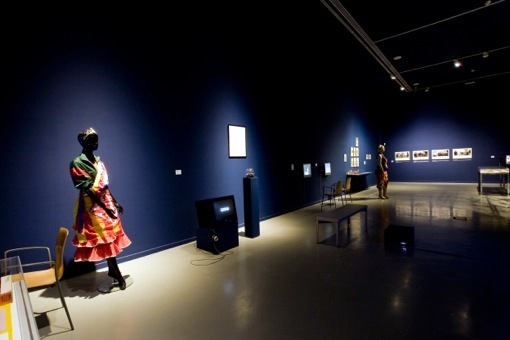La Casa Encendida ,
Jun 05, 2014 - Jul 12, 2014
Madrid, Spain
"A Critique of Migrant Reason" (or of national-catholicism as a concentration-camp ideology)
by Jaime Vindel
Ortiz’s political reversal of the Christian symbolism of the "Vía Crucis" and the imperial image of October 12 is also evident in the title of the performance: Homenaje a los Caídos refutes the Fascist consecration of its victory during the Civil War by evoking the historical reversal of national-catholicist reason and extends its critique far beyond its recognition of the Republican victims that the civil war caused. The "fallen" for the homeland were to constitute a transhistorical body of ignominy based on unresolved racial and class contradictions: not for nothing, the same national-catholicist reason that shaped otherness in the Americas was to launch a "crusade" in Spain against Jewish-communist Freemasonry, as the last stronghold in the Francoist imaginary of Jewish otherness that at one time inhabited this part of the world. The death-through-austerity policy launched by the neoliberal government during the crisis prolongs and redefines the particular outlines of that Hispanic ideology. Excluding migrants from the scope of public social-welfare policies is condoned by the same Spanish people who are enduring the pseudo-democratic projection of the oligarchic pact of post-Francoism. That is why the social protests that seek to resist the dismantling of the Welfare State must be articulated by critiquing the exclusion of migrant otherness: both issues form part of the same historical and cultural knot.
Among other things, that would require dismantling the ideological-colonial and material precepts on which the Welfare State in Western Europe has been based. We should recall that the Spanish State’s Welfare State is not an anti-Fascist victory deposited in the pacts between capital and labor after the Second World War, but the compensatory part of the "charter granted" to the people by the Bourbon Second Restoration with the complicity of the socioliberal governments of the UCD and PSOE. It was a transition from "law" to "law", from one oligarchy to another. That lack of anti-Fascist culture explains the peculiar way in which "migrant reason" operates in this country. If throughout the twentieth century there was a European nation that, in Agamben’s words, concentration camps ceased to be the exception to become the rule, that nation was Spain. It was the same Spain that in 1896 launched the concentrationary policy of the modern "nomos" by building " camps of concentrations" (sic) in Cuba, a little before the definitive decline of colonialism. It was also the same Spain that allied with Nazism in order to win the war and prolong this condition through a permanent state of emergency, by espousing Schutzhaft (literally: protective custody) of the German lager, "a juridical institution with Prussian roots that allowed certain individuals to be "placed" under custody, with the sole aim of preventing a threat to the security of the State": (6) it was the way Francoism viewed the Republican victims of reprisal who were imprisoned in forced-labor camps during the first decades of the dictatorship. In short, the same Spain that today exercises "protective custody" over "illegal" immigrants placed in detention camps against ordinary law, while also extending the suspension of real legal equality to its population in general.
A Critique of Migrant Reason shows us why that cause will also imply putting an end to "¡Santiago, y cierra España!" (St James, and close Spain’s borders!", the secular war cry of the troops of the Reconquest taken up by Spanish Fascism. It is time to open Spain up, not to the Western modernity advocated by Valle-Inclán, but to other modernities that do not pertain to it. And it is in that direction that the reflected redemption modestly offered by this exhibition points.
NOTES
1) Bustamante and F. Godoy, "Migración insurgente", el desacuerdo. cultura, política y otros desaciertos, La Paz, no 20, julio de 2014, pages 28-29.
2) Crítica de la razón migrante, Madrid, La Casa Encendida, 2014, page 49.
3) Davis, The holocausts of the late Victorian era: the famines of El Niño and the formation of the Third World. Valencia, Universitat de Valencia, 2006.
4) Quijano, "Colonialidad del Poder, Eurocentrismo y América Latina", in: Cuestiones y horizontes. Antología esencial. De la dependencia histórico-estructural a la colonialidad/ descolonialidad del poder, Buenos Aires, CLACSO, 2014 [2000], pages 777-832.
5) That legal measure has led to the death of people like Jeanneth, who arrived at an emergency ward with severely damaged kidneys caused by a common illness, after months of suffering from intense pain and abstaining from seeking treatment due to the cost it implied: http://yosisanidaduniversal.net/noticias.php/por-que-esta-muerta-jeanneth#item_792
6) Agamben, Homo sacer. El poder soberano y la nuda vida[3]. Valencia, Pre-Textos, 2003, page 212. Daniela Ortiz and Xosé Quiroga collaborate with the "Tanquem els CIE" platform ("Close the CIEs").
|













